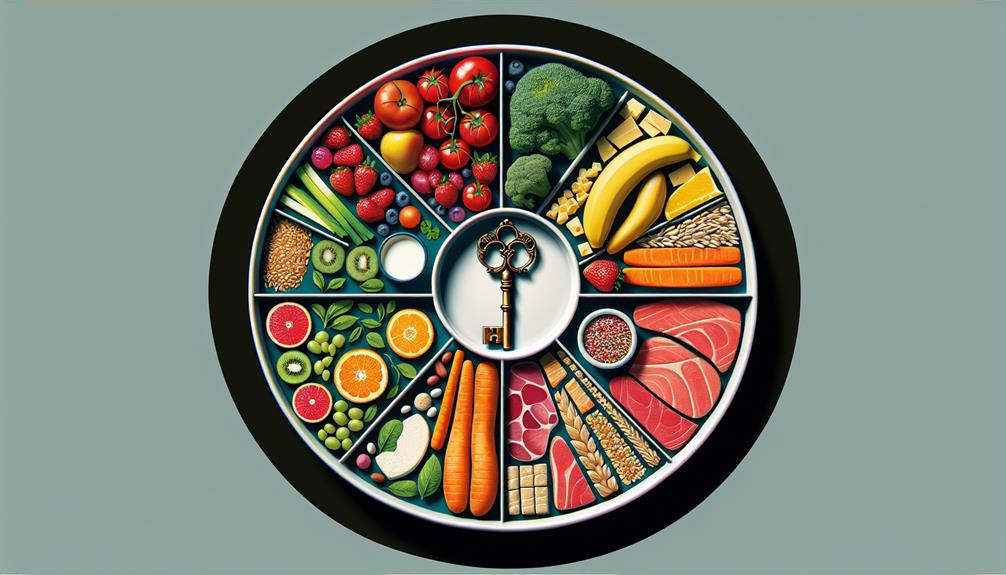
To reveal the secrets of a balanced diet, you've got to understand nutrition basics. Your body needs a diverse range of nutrients: vitamins, minerals, fiber, and water. You also need to strike a balance between carbs, proteins, and fats, which are essential for your body's energy, growth, and health. Equally important are micronutrients—though small, their deficiency can lead to serious health problems. But that's not all; debunking diet myths and practical eating tips are part of the package too. With this knowledge, you're well on your way to peak health. There's plenty more to uncover as you dive deeper into diet mysteries.
Understanding Nutritional Basics

Ever wondered about the building blocks of a healthy diet? Understanding the basics of nutrition is essential, as it informs your food choices and guarantees your body is receiving all the necessary nutrients it needs to function at its best.
First, you've got to comprehend that your body needs a diverse range of nutrients – vitamins, minerals, fiber, and water – to maintain peak health. Each of these components plays a unique role in your body's operation. Vitamins, for example, are essential for boosting your immune system and promoting cell growth.
Next, minerals are pivotal in ensuring the smooth running of your body's functions. They're crucial in everything from bone health to maintaining a regular heartbeat. Fiber, on the other hand, aids digestion, prevents constipation, and helps control weight. Lastly, water, often overlooked, is a key player in all body functions, including nutrient transportation and body temperature regulation.
In addition, you should be aware of the significance of nutrient-dense foods – these are foods that are high in nutrients but relatively low in calories. They're your ticket to achieving a balanced diet without overloading on calories.
The Importance of Macronutrients
You mustn't underestimate the importance of macronutrients in your diet. They're essential for your body's energy, growth, and overall health, as supported by numerous scientific studies.
In the next section, we'll discuss the ideal macronutrient ratios and their specific roles in your diet.
Understanding Macronutrient Ratios
Understanding the ratio of macronutrients in your diet isn't just about counting calories; it's a vital aspect of achieving peak health and maintaining energy levels throughout the day. This ratio typically refers to the percentage of your daily calories that come from the three key macronutrients: carbohydrates, proteins, and fats.
Striking a balance between these macronutrients is more of an art than a science, and it can have a profound effect on your wellbeing. For instance, consuming too much fat and too few carbohydrates could lead to fatigue, while a diet high in protein and low in fat mightn't provide enough energy for your daily activities. Keeping these ratios in check is crucial.
Research shows that a balanced macronutrient ratio can help manage weight, improve body composition, and reduce the risk of chronic diseases like heart disease and diabetes. For optimal health, the Dietary Guidelines for Americans recommends a macronutrient ratio of 45-65% carbohydrates, 10-35% protein, and 20-35% fat. Remember, these are general guidelines and individual needs may vary.
Consult a dietitian or nutritionist to help customize a plan that's right for you.
Role of Macronutrients in Diet
Now that we've reviewed the significance of macronutrient ratios, let's explore the individual roles of carbohydrates, proteins, and fats in your diet and why they're so important for peak health.
Carbohydrates are your body's primary energy source. Recent studies show that complex carbs like whole grains, fruits, and vegetables maintain your blood sugar levels, preventing energy crashes.
Proteins, on the other hand, are the building blocks of your body. They're essential for tissue repair, muscle growth, and immune function. They're also key players in hormone and enzyme production. A study in the American Journal of Clinical Nutrition highlights that a high-protein diet can aid weight loss by boosting metabolism and reducing hunger.
Lastly, don't overlook fats. They're crucial for absorbing vitamins A, D, E, and K and for producing hormones. Contrary to popular belief, not all fats lead to weight gain. Monounsaturated and polyunsaturated fats, found in avocados, nuts, and fish, can decrease your risk of heart disease, according to the American Heart Association.
Micronutrients: Small but Mighty

Despite their tiny size, micronutrients pack a powerful punch in maintaining our body's overall health and well-being. These essential vitamins and minerals are critical for many bodily functions, including energy production, immune function, and blood clotting. And, while they're required in only small amounts, a deficiency can lead to serious health problems.
To help you understand their importance, let's take a look at a few micronutrients and their functions:
| Micronutrient | Function | Food Source |
|---|---|---|
| Vitamin A | Good vision, growth & development | Carrots, sweet potatoes |
| Vitamin C | Immune function, iron absorption | Oranges, strawberries |
| Iron | Oxygen transport, immune function | Spinach, red meat |
| Zinc | Immune function, wound healing | Oysters, beef |
You can't underestimate the power of these small but mighty nutrients. By ensuring you're getting a balanced diet full of various fruits, vegetables, meats, and grains, you're setting up your body for peak health. It's not about quantity, but quality. Remember, your body's a finely tuned machine, and micronutrients are the oil that keeps it running smoothly.
Debunking Diet Myths
Let's debunk some common diet myths that often lead people astray in their quest for peak health.
First, the notion that 'carbs are the enemy' is misleading. While excessive intake of refined carbs can contribute to weight gain and health issues, complex carbs like whole grains, fruits, and vegetables are essential for energy and overall health.
Second, the popular belief that 'fats make you fat' is only partially true. Trans fats and saturated fats can lead to health problems, yes, but monounsaturated and polyunsaturated fats, found in foods like avocados, nuts, and fish, actually contribute to satiety, nutrient absorption and heart health.
Lastly, 'detox diets cleanse your body' is a myth. Your liver and kidneys are constantly detoxifying your body. There's no scientific evidence to support the idea that detox diets remove toxins from the body.
Practical Tips for Balanced Eating

To maintain a healthy diet, it is crucial to incorporate a variety of foods rich in different nutrients, making sure you're not just filling up on empty calories but getting the essential vitamins and minerals your body needs. Here are some innovative tips to help you achieve balanced eating.
First, practice portion control. Overindulging, even in healthy foods, can lead to weight gain. Using smaller plates can trick your mind into thinking you're eating more than you actually are.
Second, plan your meals ahead of time. Not only does it help to prevent impulsive junk food consumption, but it also guarantees you're getting a mix of all necessary nutrients throughout the week.
| Tip | How it Helps |
|---|---|
| Portion Control | Avoids overeating, maintains calorie balance |
| Meal Planning | Ensures a variety of nutrients, prevents junk food binges |
Third, stay hydrated. Water plays a critical role in every bodily function. It aids digestion and nutrient absorption while helping to control your appetite.
Overcoming Common Dietary Challenges
How can you successfully navigate common dietary challenges that might impede your journey towards a balanced diet? The answer lies in innovative problem-solving strategies and a deep understanding of your body's needs.
Firstly, overcoming cravings requires you to discern between physical hunger and emotional hunger. You might feel the urge to eat when you're actually bored, stressed, or tired. Drink water, take a walk, or engage in a hobby when you feel a craving coming on. Studies show that these simple actions can effectively curb unnecessary eating.
Next, let's tackle the issue of portion control. It's essential for maintaining a balanced diet yet often overlooked. Use smaller plates and bowls to trick your brain into thinking you're eating more than you actually are. A study from the University of Cambridge suggests this trick can help reduce food consumption by up to 16%.
Lastly, nutrient deficiencies can be a significant challenge. Regular blood tests can help identify deficiencies early. Then, enhance your diet with nutrient-dense foods or supplements.
Frequently Asked Questions
How Does Intermittent Fasting Impact a Balanced Diet?
Intermittent fasting can boost your balanced diet's efficiency. It enhances metabolic health, aids weight loss, and can improve longevity. However, it's essential you're still consuming nutrient-rich foods during eating periods for maximum health benefits.
Can Certain Foods Improve Mental Health?
Yes, certain foods can indeed boost your mental health. Omega-3 fatty acids in fish, antioxidants in berries, and vitamin B in leafy greens have shown to enhance mood and combat depression. It's food for thought!
What Is the Role of Genetics in Dietary Requirements?
Your genetics play a significant part in your dietary needs. They influence how you metabolize food, your propensity to certain health conditions, and even your preferences for certain tastes. It's more than just calories.
How Can I Maintain a Balanced Diet While Traveling?
While traveling, you can maintain a balanced diet by planning ahead. Pack healthy snacks, choose accommodations with a kitchen to cook meals, and research local restaurants' menus for nutritious options. It's all about smart choices.
Are There Specific Diets Recommended for Pre and Post-Workout?
Yes, there are. Pre-workout, you'll need carbs for energy and protein for muscle repair. Post-workout, you should replenish with carbs and proteins too, but add some healthy fats to help recovery.




